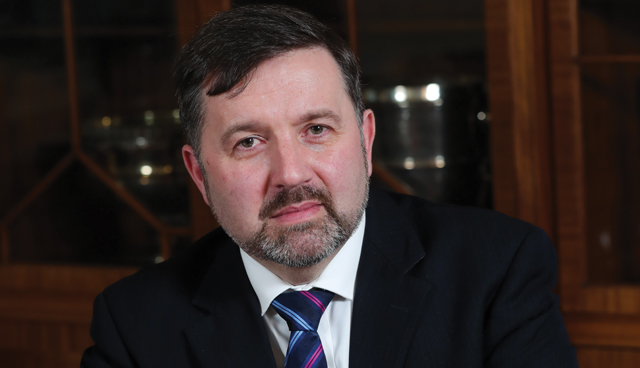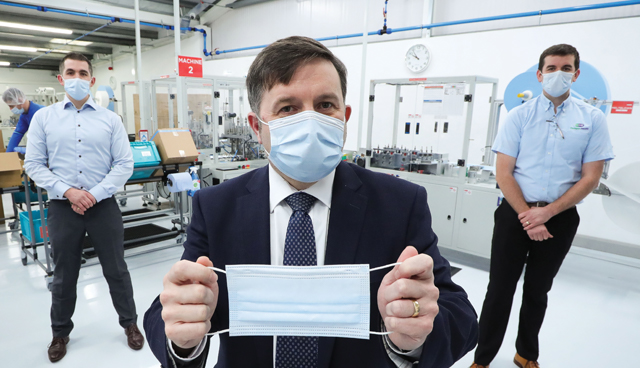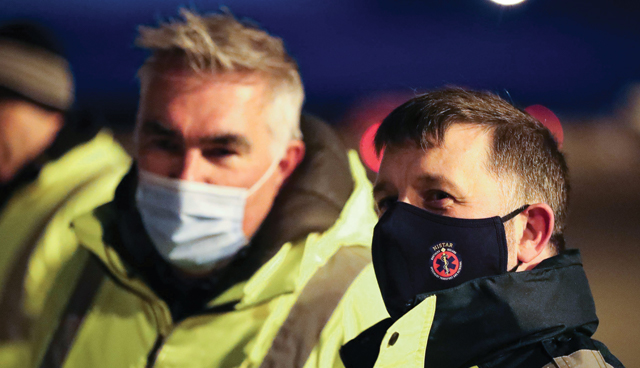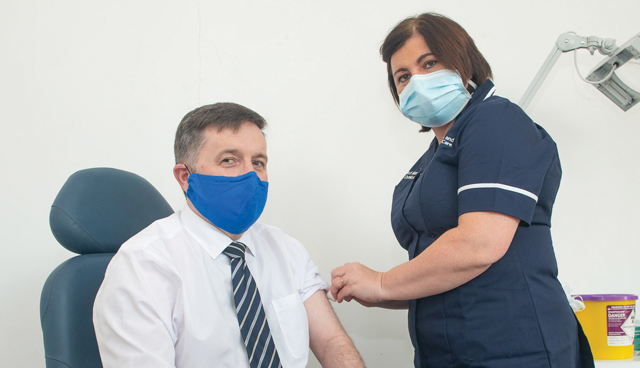Health Minister Robin Swann: ‘No time for complacency’

Health Minister Robin Swann MLA discusses waiting lists, vaccination rollout and rebuilding
Looking back over the course of the pandemic, what are the major lessons for the Department of Health?
The pandemic has highlighted serious, long-established fragility in our health and social care system, especially in staffing capacity. Our health and care system was under immense and growing pressure long before the pandemic. Ten years of financial stringency and short-termism had undoubtedly taken its toll. During the last decade, our health system has been repeatedly documented as being out of date and failing. Sir Liam Donaldson’s 2015 report, The Right Time, The Right Place, referred to Northern Ireland having an “ossified model of care”, with specialist staffing resources “too thinly spread”.
“Undoubtedly, the pre-existing fragility in our system also hampered our response to the pandemic and underlined the particular need for caution in Northern Ireland as we emerge from lockdown.”
Similarly, the 2016 Bengoa report, which was endorsed by the Northern Ireland Executive and the other parties in the House, referred to the model of care as “outdated” and “not the one that Northern Ireland needs”. It also stated: “The current configuration of acute services is simply not sustainable in the short to medium term.”
The following year, an expert panel assessed our adult social care system, and its report, Power to People, concluded that it was “collapsing in slow-motion”. The decade of chronic underfunding has had consequences, not least of which is the failure to build greater capacity and resilience. We have some of the best staff and most innovative treatments in the world. Northern Ireland should simply not have the waiting times that it has. They have been intolerable for some time and have grown worse. The time for words of concern has passed. I firmly believe that we require a period of firm action now. The hundreds of thousands of people who are on a waiting list deserve no less.
Undoubtedly, the pre-existing fragility in our system also hampered our response to the pandemic and underlined the particular need for caution in Northern Ireland as we emerge from lockdown. The publication of the trust rebuilding plans comes as we emerge from the severe third Covid wave, which has further depleted the resilience of our health and social care system. Over the winter, our health and social care services have been under pressure like never before. I am pleased that we are now coming out of the latest Covid-19 wave, and, while there is no time for complacency, the highly successful rollout of the vaccine is giving real hope. I am aware that our hard-pressed health and social care staff, especially those who have worked in the most challenging roles over the past 13 months, are in need of rest, and that is reflected in the trust rebuild plans. However, I also know that they wish for nothing more than a return to their normal duties, delivering the care that they are expertly trained to do.
What are the principles informing your ambition to rebuild the health and social care system?
The trust rebuild plans are based on five principles, which are, first, that we de-escalate ICU as a region; secondly, that staff are afforded an opportunity to take entitled annual leave; thirdly, that elective care is prioritised regionally to ensure that those who are most in clinical need, regardless of place of residence, get access first; fourthly, that all trusts seek to develop green pathways with the aim of maximising theatre throughput; and, fifthly, that the Belfast City Hospital Nightingale facility is prioritised for ICU de-escalation in order to increase regional complex surgery capacity as quickly as possible.
For that fifth principle, I was recently able to confirm that the Belfast City Hospital Nightingale facility is now closed, with the last remaining ICU patients vacating the site on Friday 9 April. I am also pleased that the trust rebuild plans reflect our many regional initiatives, not least my action to ensure that all elective surgery is prioritised in line with greatest clinical need and is not dependent on a patient’s postcode.

Alongside the trust rebuild plans a data annex has been included that sets out the trust activity projections for the three-month period of April to June 2021. The activity projections for May and June are indicative at this stage and will be constantly reviewed. That reflects the ongoing high degree of uncertainty that we continue to face, but it is also because I want to make sure that, if it becomes clear going forward that trusts can do more, I expect them to do that, even in the context of many competing challenges and uncertainties. I still want to see as much activity delivered as quickly as we can.
The New Decade, New Approach agreement pledged to address the waiting list crisis. What is the expected timeframe for the delivery of action plans on waiting times and cancer care? What are the critical elements you believe will change the status quo?
Our health service prides itself on being available to all and free at the point of access. I contend that we are still in grave danger of undermining this essential feature of our health service. With ever-growing waiting lists, I question whether all of our citizens have adequate access to the health service that they need. The people of Northern Ireland deserve better than having to wait months or, in many cases, years for access to elective healthcare. Many suffer pain and discomfort while they wait.
We simply cannot let the situation continue to deteriorate. If we are to address the dire situation that we face we need to have the support of all elements of society and in particular a united political front across the Assembly and Executive. As I have said repeatedly, we will need to utilise every square foot of space that we have in our hospitals. Each hospital may not provide every service that it has in the past. The challenge of the regional approach is to put an orthopaedic surgeon in one centre where he can see more patients than can be seen in three orthopaedic services doing a lesser degree of work in a number of other capacities.
Too often we have seen politicians using the sort of language that unnerves staff. There is nothing more unnerving for people working in our health service than social media campaigns about saving their hospital when it is not under threat.
I would ask everyone, especially politicians, to step away from the party-political campaigns and support the staff who are working in the hospitals to deliver the entirety of the services in those facilities. As I have said, we do not have enough staff. We need more staff, so no one will be done away with. We do not have a big enough footprint, and we need every square foot that we have. It may not be that everyone gets every service that they want delivered on their doorstep, and that has to be the reality, if we are to address the waiting lists that we are talking about today. It also has to be about a political commitment from all politicians to Bengoa and all the other reforms that have been talked about. Now is the time to implement those changes and stop talking about them. We had three years when we were unable to meet the challenges and make the transformations that were needed. Now is the time, as we come out of the pandemic, to serve the people of Northern Ireland by addressing the huge challenges that face us.
We have seen that professionals and healthcare staff are willing to travel. It is not just surgeons; the entirety of the team — anaesthetists, ICU nurses and everybody who makes up the surgical delivery team — are willing to travel to access theatre capacity, recovery beds and ICU beds for their patients. The professionals in our health service very much see people as their patients. People are now willing to travel. Realistically, Northern Ireland is not a big place, especially if you need a surgical procedure. We have seen that people are now willing to travel.

The challenge is no longer for health professionals or patients; the challenge is for us politicians to let the clinical demand be met by the clinicians, who can deliver a service, no matter where it is, on a safe site, using the green lists and regional priorities so that those who are in most clinical need are seen more quickly than by using the postcode in which they live or want to be treated. One of the outworkings of the pandemic has been the breaking down of silos across the entire health service. From primary care hospitals to community pharmacy, everyone working in the healthcare family has pulled together and pooled the resources. That will serve Northern Ireland well because the staff want to get back to the day-to-day work of seeing and treating patients.
How confident are you that funding on a multi-year basis will be made available to the Department of Health and to what extent is this critical to address the enduring challenges in the health system?
The present funding model that we operate within is not fit for purpose. What is really needed is a multi-year budget, and, unfortunately, the Executive have not received that from Westminster. One-off Covid funding cannot be effectively deployed in rebuilding services as that requires us to make multi-year commitments to training places and to appoint people to permanent posts in order to attract and retain staff. We require major sustained investments to rebuild our services. In particular, increasing the capacity of our elective care system, whether in-house or in the independent sector, requires a significant recurrent funding commitment. Only with such a commitment can we begin to invest in the staff and infrastructure required to make progress. At a minimum, a recurrent source of earmarked funding agreed in advance is needed to close the capacity gap and to address the patient backlog. An incremental year-on-year increasing allocation will be required, and it could take five to 10 years to return waiting times to an acceptable level. Longer-term surety of funding at a significant scale will enable innovations in-house and with independent sector providers.
“Our health service prides itself on being available to all and free at the point of access. I contend that we are still in grave danger of undermining this essential feature of our health service.”
Northern Ireland’s vaccination rollout has been widely commended. As the rollout continues, do you have any concerns around vaccine hesitancy? If so, how can these be addressed?
I have visited a large number of vaccination sites from the huge operation at the SSE Arena down to a local pharmacy, where I received my first dose. One of the most emotive of those visits was when I went to the Ballymena centre in the Seven Towers Leisure Centre. The majority of the staff on duty were volunteering and working on their days off to deliver vaccines, because they see it as such a psychological lift for them and for the people of Northern Ireland.
They are providing part of the relief and part of the way out of what has been a terrible 14 months. Those staff, some of whom have come back from retirement, and some of whom are trainees, have energy, commitment, and drive. I spoke to physiotherapists, speech and language therapists and dieticians, all of whom had come forward to be part of the vaccine programme because they see it as such a positive thing that our health service is doing.
Talking to the centre manager, I learned that one of the things that they did not prepare for when they established the centre was putting boxes of hankies in each vaccination booth. The manager said that the number of people who burst out in tears because of the relief of getting the vaccine was immeasurable.
Those releases that the vaccinators and those who are vaccinated are getting are immeasurable. I am glad that the Member has got his vaccine, and I am glad that some one million of our citizens have already been vaccinated but would urge those who have yet to do so to come forward. Our vaccination programme has already saved many lives and is protecting our loved ones and bringing down infection rates to a point where we can see normality on the horizon. However, as we start to see restrictions easing this is exactly the time when we must make sure that we don’t see an easing off in our vaccine uptake rates.
Vaccines are helping us get back to doing the things we have missed; they protect you and those around you. This new campaign is a poignant reminder of some of the things we have to look forward to as a society. The Covid-19 vaccines are safe and very effective. The vaccines have gone through the same safety checks as any of the other long-established vaccines and will protect you and the people close to you. It’s vital that as many people as possible book their vaccine when given the opportunity so we can continue to reduce the impact of this awful virus on our lives, and I urge everyone to play their part and get their jab when invited. If you are eligible for the vaccine, book it without delay to help protect yourself and those around you. Most people won’t receive an invitation for their vaccination, you just need to go ahead and book it as soon as you are in an eligible age group.
What is your assessment of cross-border collaboration in relation to the public health response to Covid-19?
It was obvious from the very beginning of the pandemic that the virus would recognise no border and as such we had mutual interest to work closely and collectively. So, it was important, not least in the interests of public health, that there was sustained collaboration. Last April, I was pleased that a Memorandum of Understanding was formally agreed between both departments of to underpin and strengthen that important north-south co-operation.

Over the last 15 months, there has been significant collaboration, especially at Chief Medical Officer level. I have on occasions been frustrated that despite what I thought to have been best efforts the cooperation was not always what it ought to have been on a political level. Too many key announcements were made in isolation and for instance there are still wholly excessive delays to resolving the important issue of sharing key information on international passengers coming up from the Republic of Ireland.
How important is the delivery of a long-term mental health strategy for Northern Ireland in the current context?
One of the first initiatives that the Executive took was to establish the Executive working group on mental well-being, resilience and suicide prevention. That set the tone and tenor for what we were going to do about mental health and for how the Department was able to move forward. I have said before that no matter how bad the first pandemic was we still moved ahead and launched the mental health strategy. It was something that we had committed to doing, that we were going to do and that needed to be done. That is why we went ahead and appointed our first interim mental health champion: to make sure that we recognised mental health and the challenges that it presents to the people of Northern Ireland and got it the recognition that it needs in our health service, this place and the Executive, so that mental health services could get the support — practical, financial and political — that they need to address many of the challenges that they have long faced across Northern Ireland. In particular, I believe we need to have a specific focus on funding for the voluntary community groups, charity organisations and specialist organisations that have experience and knowledge of how to address the issue at a community level, to challenge what needs to be challenged and to address what needs to be addressed. The challenge that I have is that the funding is non-recurrent. It is not long-term funding, and that puts additional stress and strain on the people who are already doing that work and will continue to do it.
Would you be willing to take on the health portfolio again in the next mandate if conditions permitted?
That is a question that is not for me to answer. My appointment as Health Minister was within the gift of my party leader but I was honoured and privileged to accept the opportunity it provided me to serve the people of Northern Ireland, but first and foremost it lies with the electorate of North Antrim.
The National Health Service is precious to me. It is precious to me not just as Health Minister but because of the support that my family has received from it, like many families across Northern Ireland. The core strength of our National Health Service is that it is free at the point of need, free at the point of care and free at the point of delivery, no matter the ailment or stress.





